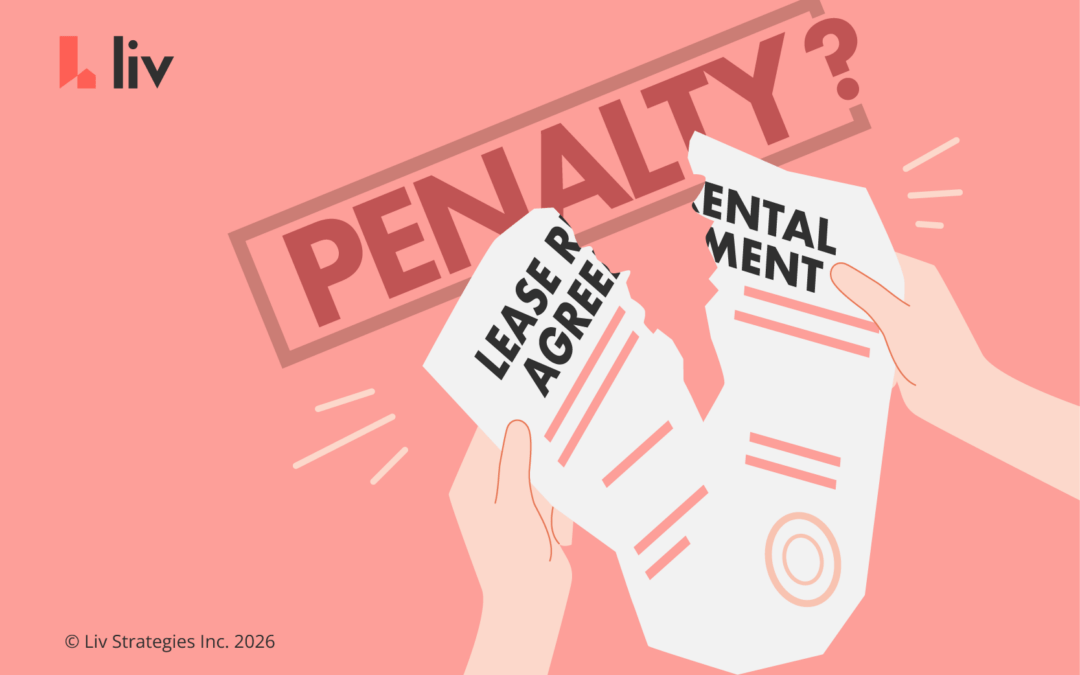Renting without a lease in Canada means living in a rental without a signed written agreement, often based on a verbal understanding between tenant and landlord. While this might seem convenient, especially for short-term stays, it carries legal and financial risks. Verbal agreements can be legally binding, but they often lack clarity around key terms like rent increases, maintenance, and evictions. This can lead to disputes and uncertainty for both parties. Tenants may face sudden eviction or issues with deposits, while landlords may struggle to enforce rules or end tenancies. Understanding these risks is crucial in Canada’s rental market. This guide by liv.rent outlines exactly what you need to know when renting without a lease, whether you are a tenant or a landlord.
Rent your perfect home with liv.rent
Search houses, rooms, condos and apartments for rent. Chat instantly with verified landlords. Apply to multiple listings. Save your chat history & signed documents all on one platform.
What is a lease agreement?
A lease agreement is a legally binding contract between a landlord and tenant that outlines the terms and conditions of renting a property. In Canada, lease agreements typically include essential details such as the monthly rent, payment due dates, length of tenancy, responsibilities for repairs, rules around pets, and procedures for ending the lease. These contracts help protect both parties by clearly defining their rights and obligations.
While leases can be written or verbal, a written lease provides far greater clarity and protection. Most provinces, including Ontario and British Columbia, have standard lease templates that landlords must use for residential tenancies. These documents are especially important in resolving disputes, as they serve as official proof of the agreed-upon terms. Without a lease, many of these details are open to interpretation, increasing the likelihood of conflict. One of the benefits of the liv.rent platform is digital integration of the RTA and OREA lease for British Columbia and Ontario, adding another layer of security and convenience. Additionally, to improve the rental experience, new features have been added. Persona allows users to see approval results immediately, with no manual wait time. The listing section has also been updated—”shared/partial listings” have been renamed to “private suites,” and subtypes are now available to make filtering and posting listings more clear.
Enjoy the biggest savings this holiday!
Save up to 40% on ads, tenant screening, and more — everything you need to rent out your listing faster and with confidence. Purchase now and redeem your credits anytime within 12 months.
>> Read More: How To Negotiate Rent: 6 Steps That Save Tenants Money
Renting in Vancouver without a written lease?
In Vancouver, it’s legal to rent a property without a written lease, but doing so can be risky. British Columbia’s Residential Tenancy Act still applies to verbal rental agreements, meaning tenants and landlords are protected by law even without a signed contract. However, the lack of written terms makes it harder to prove what was agreed upon if disputes arise.
- Tenants are still protected: Renters without a lease are entitled to notice for rent increases, protection from illegal eviction, and the right to live in a safe, maintained home.
- Landlords face enforcement challenges: Without written proof of tenancy terms, it may be difficult to hold tenants accountable for damage, late payments, or violations.
- Disputes rely on evidence: In the absence of a lease, communications like texts, emails, or receipts can become critical in resolving issues.
While renting without a lease is allowed, it’s not recommended. Even a basic written agreement offers stronger protection for both tenants and landlords in Vancouver.
Tenants without a lease in other provinces
In both Ontario and Alberta, tenants without a written lease are still covered under provincial residential tenancy laws. If a tenant moves in and pays rent, a tenancy is legally established, even without a formal contract. That said, the lack of documentation makes it harder to define specific expectations, which can lead to disputes.
- Ontario: Under the Residential Tenancies Act, all rental agreements are considered legal whether written or verbal. However, landlords are required to provide tenants with a copy of the Ontario Standard Lease. If they don’t, tenants still have full legal protections.
- Alberta: The Residential Tenancies Act also recognizes verbal leases, but encourages written agreements. Landlords in Alberta must still follow notice periods and maintenance standards, even if there is no written lease.
- Manitoba & Quebec: This goes the same for Manitoba and Quebec.
- Nova Scotia: In Nova Scotia, if there is no signed copy or paper copy of a lease, the lease will automatically default to a month-to-month tenancy, and both tenants and landlords still have all the rights and responsibilities under the Residential Tenancies Act.
- Key differences: In Ontario, landlords are legally required to provide the standard lease form for new agreements, while in Alberta, this is strongly encouraged but not mandatory.
In all provinces, renting without a lease leaves too much room for miscommunication. Tenants should always request written confirmation of the most important terms, even in an informal rental setup.
No lease agreement? What are my rights as a tenant?
Even without a written lease, tenants in Canada still have legal protections under provincial tenancy laws. A tenancy is automatically created when a tenant pays rent and takes possession of the property, regardless of whether anything has been signed. This means that even verbal rental agreements trigger legal responsibilities for both landlords and tenants.
- Right to proper notice for eviction or rent increases: Landlords must follow provincial rules when it comes to ending a tenancy or raising the rent. For instance, in British Columbia, tenants must receive written notice at least two months in advance for eviction due to landlord use, and rent increases can only happen once per year with three months’ notice. In Ontario, rent can only be raised once every 12 months and requires 90 days’ written notice.
- Right to a safe, maintained, and habitable home: All tenants, regardless of whether they have a written lease, have the right to live in a home that meets provincial health, safety, and maintenance standards. This includes functioning plumbing and heating, pest control, and basic structural safety.
- Right to dispute resolution: Tenants can file complaints or applications to provincial boards or tribunals even without a lease. In B.C., that’s the Residential Tenancy Branch. In Ontario, it’s the Landlord and Tenant Board. These bodies review disputes around rent, repairs, deposit returns, and more.
- Right to privacy and quiet enjoyment: Tenants are entitled to privacy, meaning landlords must give proper notice before entering the unit, even if there’s no lease. Most provinces require 24 hours’ written notice.
While a written lease helps clarify responsibilities and avoid conflict, tenants without one are not powerless. If you’re renting without a lease, it’s important to document communication with your landlord, keep receipts of rent payments, and understand your rights under local tenancy laws.
What rights do landlords have without a lease?
Landlords in Canada also maintain legal rights even when there’s no written lease in place. Once a tenant moves in and begins paying rent, a tenancy is established under provincial legislation, granting landlords certain protections and responsibilities just as it does for tenants.
- Right to collect rent: If a tenant is occupying the unit, the landlord has the right to expect rent to be paid regularly, even if the amount and due date were verbally agreed upon. If rent is missed, the landlord can pursue legal remedies under provincial law.
- Right to issue proper notice: Landlords can still issue notices for eviction, repairs, or rent increases, but must follow the required procedures. For example, in Ontario and B.C., landlords must provide specific forms and timelines depending on the situation, even without a lease.
- Right to enter the property with notice: Most provinces require 24 hours’ written notice before a landlord can legally enter a rental unit, unless it’s an emergency. This applies regardless of whether there’s a written lease.
- Right to enforce general rental rules: While some specifics may be harder to prove without a written contract, landlords can still set and enforce reasonable rules about the use of the property, provided they comply with human rights and tenancy laws.
Despite these rights, a landlord without a written lease has limited ability to prove the terms of the rental arrangement in a legal dispute. That’s why even a simple written agreement is strongly recommended, it provides clarity on rent amounts, responsibilities, and termination conditions.
Risks of a no rent lease agreement
Renting without a lease whether you’re a tenant or a landlord, opens the door to numerous risks that can complicate or even damage the rental relationship. While oral agreements are legal in most provinces, they lack the detail and clarity of written contracts, which often leads to miscommunication and legal challenges.
- Lack of clear terms: Without a lease, there’s no written record of essential details like the rental rate, payment due dates, length of tenancy, or rules on guests and pets. This leaves both parties vulnerable to misunderstandings or disputes.
- Difficulty enforcing rights: In the event of a disagreement, such as over damage deposits, late rent, or maintenance obligations, it can be difficult to prove what was agreed upon. Courts and tribunals rely heavily on written evidence.
- Increased risk of eviction or legal action: Tenants may be more vulnerable to sudden eviction, especially if the landlord denies that there was a formal agreement. Likewise, landlords may find it harder to remove problematic tenants without documentation.
- Problems with rent increases or changes: Without a lease specifying how rent changes are handled, disputes can arise when landlords try to increase rent or change conditions. This can lead to unnecessary conflict or even legal battles.
- Strained communication: A lack of clear expectations can damage the landlord-tenant relationship over time, especially when either party believes the other is acting unfairly.
What should you do if you’re renting without a lease?
If you’re already renting without a lease, it’s important to take steps to protect yourself and reduce potential risks. Whether you’re a tenant or a landlord, there are simple actions you can take to create more clarity and legal security.
- Document everything: Save all communication related to rent, maintenance, and agreements, whether by text, email, or written notes. This can serve as evidence if disputes arise later.
- Request or offer a written lease: Even if you’ve started without one, it’s never too late to formalize your arrangement. Landlords can use provincial standard lease forms, and tenants can request a copy to ensure mutual understanding.
- Confirm key terms in writing: If a full lease isn’t possible, at least get the essential terms, such as rent amount, payment dates, duration, and rules, in writing and signed by both parties.
- Understand your legal rights: Familiarize yourself with the tenancy laws in your province. Visit resources like the Residential Tenancy Branch (B.C.), the Landlord and Tenant Board (Ontario), or Service Alberta for guidance on your rights and responsibilities.
- Use secure rental platforms: Renting through digital platforms like liv.rent provides built-in features like digital contracts, verified listings, and secure payment methods that help reduce the risks associated with informal agreements.
Unlock exclusive insights into Canada’s rental market
Download the full 2025 Trend Report for insights on average rent prices, rental market comparisons, key market drivers, and a deep dive into landlord and renter perspectives on the current rental landscape.
FAQs about renting without a lease in Canada
What does renting without a lease mean in Canada?
It means living in a rental unit without signing a written lease agreement. The tenancy is often based on a verbal understanding between landlord and tenant. Even without paperwork, this arrangement can still be legally recognized under provincial tenancy laws.
Is renting without a lease legal in Ontario, BC, or Alberta?
Yes. In all three provinces, verbal rental agreements are legal and enforceable. However, landlords in Ontario are required to provide the Standard Lease Form, even if the agreement begins verbally.
What rights do I have if I’m renting without a lease?
Tenants still have key rights, including the right to proper notice before eviction, rent increase limits, access to dispute resolution, and the right to a safe and habitable living space, even without a written lease.
Can landlords evict tenants without a lease in Canada?
Not without following legal procedures. In most provinces, landlords must provide written notice and valid reasons for eviction. The absence of a lease does not remove a tenant’s right to proper notice or due process.
Do verbal rental agreements count as leases?
Yes. If a tenant pays rent and occupies the unit, a verbal agreement is generally treated as a legal lease under provincial laws. That said, verbal agreements are harder to prove and may lead to more disputes.
Can you be evicted without a lease?
Yes, but only under legal guidelines. Tenants without a lease can still only be evicted through proper notice and valid cause, as outlined in each province’s tenancy regulations.
Do I still have tenant rights without a lease?
Absolutely. Tenants are protected by law even without a written lease. Your rights include safe housing, privacy, proper notice for eviction or rent increases, and access to provincial dispute resolution systems.

Rethink The Way You Rent
Not on liv.rent yet? Experience the ease of digital applications & contracts, verified tenants & landlords, virtual tours and more – all on one platform. Sign up for free or download the app.
Subscribe to receive the latest tenant & landlord tips and get notified about changes in the Canadian rental market.
>> Stay up-to-date on the average rent in Vancouver, Toronto and Montreal: Rent Reports.




0 Comments